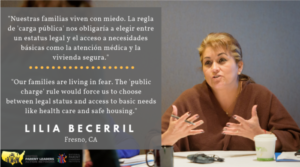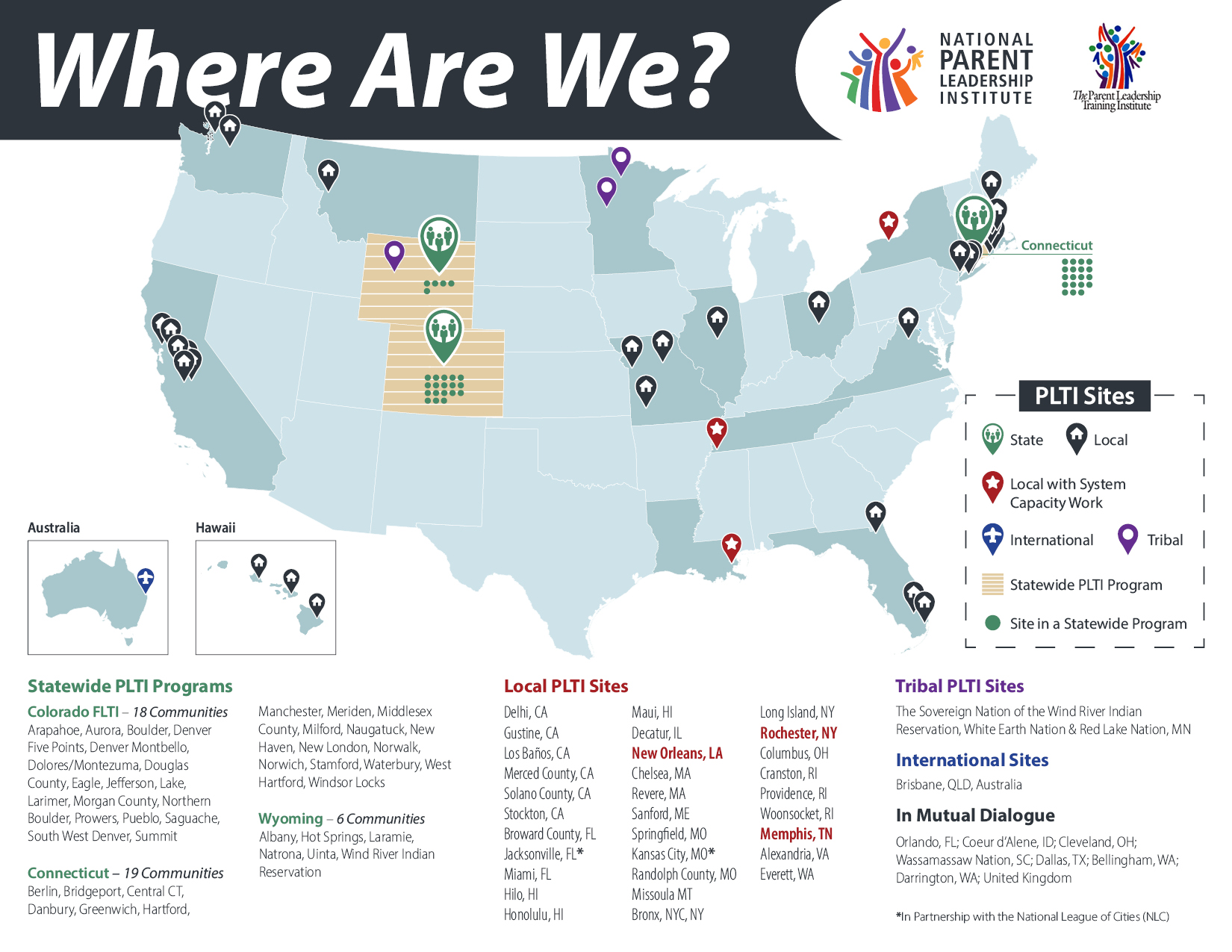Take Action on Immigration Policy Change: “Inadmissibility on Public Charge Grounds”
A Proposed Rule by the U.S. Department of Homeland Security on October 10, 2018
ACTION: Submit public comment by December 10, 2018 (details follow below).
BACKGROUND: As a core member partner of United Parent Leaders Action Network (UPLAN), the National Parent Leadership Institute (NPLI) brings this important issue forward to inform parent leaders and partners on this critical proposed immigration policy change that will affect immigrant families across the United States. U.S. Citizenship and Immigration Services under the Department of Homeland Security (DHS) has proposed changes that would make it more difficult for immigrants applying for legal permanent residence (green card), visa or adjustment status to receive approval based on them being determined public charges. Simply put, public charges are people deemed to be primarily reliant on public resources to meet their needs, rather than rely on their own capabilities and the resources of their families, their sponsors, and private organizations. [INA 8 U.S.C. § 1601 (PDF)]
Current U.S. law requires that immigrants demonstrate financial self-reliance or self-sufficiency. The Immigration and Nationality Act (INA) states that an applicant is inadmissible if he/she is determined “likely at any time to become a public charge.” The INA itself does not communicate strong evaluative measures for determining whether an immigrant is likely to become a public charge. Rather, it lists five factors to be “taken into account:” (1) age; (2) health); (3) family status; (4) assets, resources and financial status; and (5) education and skills. Some families would have to choose between meeting basic needs like food and health care, or securing legal status to live together as a family in the U.S. under the proposed changes.
What Can You Do To Help?
There is a 60-day period before the proposed rule can be adopted; this allows time for public comments to oppose it. This is your opportunity for civic engagement – speak up for immigrant rights so that this proposal is not adopted.
1. Submit a formal comment by December 10, 2018.
- ONLINE at Federal e-Rulemaking Portal (preferred): Click here or go to www.regulations.gov. Follow the website instructions for submitting comments.
- MAIL IN your personal comment to:
Samantha Deshommes, Chief, Regulatory Coordination Division
Office of Policy and Strategy, U.S. Citizenship and Immigration Services
Department of Homeland Security
20 Massachusetts Avenue NW
Washington, DC 20529-2140
To ensure proper handling, please reference DHS Docket No. USCIS-2010-0012 in your correspondence. Mail must be postmarked by the comment submission deadline.
2. Share your story. UPLAN and other partners are looking for those affected to share their stories with elected officials and the media. Please contact UPLAN using this link to share your story. Or reach out to us at nationalplti@gmail.com
CLOSING: Below are resources that you might find useful. Thank you for your consideration in taking action on this important issue.
Resources:
- PDF of this page. / Espanol
- UPLAN – visit this link for sample comments you can personalize and other resources on this issue.
- Federal Register – proposed rule in detail
- U.S. Citizenship and Immigration Services – Proposed Change to Public Charge Ground of Inadmissibility

Tema de política
Inadmisibilidad por razones de Carga Pública
Una regla propuesta por el Departamento de Seguridad Nacional de los Estados Unidos el 10 de Octubre de 2018
November 2018
Como miembro central y socio de United Parent Leaders Action Network (UPLAN), el National Parent Leadership Institute (NPLI) trae información importante para informar a los padres líderes y otros socios sobre el cambio de política de inmigración propuesto que afectará a las familias inmigrantes en todo Estados Unidos. Los Servicios de Ciudadanía e Inmigración del Departamento de Seguridad Nacional (DHS) de EE. UU. han propuesto cambios que dificultarían que los inmigrantes que solicitan la residencia permanente legal (tarjeta verde), la visa o el estado de ajuste reciban la aprobación si se determina que es o si se determina que es probable que ser una carga pública (s). En pocas palabras, un cargo público es un inmigrante que se considera que depende principalmente de los recursos públicos para satisfacer sus necesidades, en lugar de confiar en sus propias capacidades y los recursos de sus familias, sus patrocinadores y organizaciones privadas.
La ley actual de los Estados Unidos requiere que los inmigrantes demuestren la autosuficiencia o autosuficiencia financiera. La Ley de Inmigración y Nacionalidad (INA) establece que un solicitante es inadmisible si se determina que “es probable que en cualquier momento se convierta en una carga pública”. El propio INA no comunica medidas de evaluación sólidas para determinar si es probable que un inmigrante se convierta Una carga pública. Más bien, enumera cinco factores a ser “tomados en cuenta:” (1) edad; (2) salud); (3) estado familiar; (4) activos, recursos y estado financiero; y (5) educación y habilidades. Algunas familias tendrían que elegir entre satisfacer necesidades básicas como alimentos y atención médica, o asegurar un estatus legal para vivir juntos como una familia en los Estados Unidos bajo los cambios propuestos.
¿Qué puedes hacer para ayudar?
Hay un período de 60 días antes de que se pueda adoptar la regla propuesta; Esto da tiempo para que los comentarios públicos se opongan. Esta es su oportunidad para el compromiso cívico: defienda los derechos de los inmigrantes para que no se adopte esta propuesta.
- Envie un comentario formal antes del 10 de Diciembre, 2018.
- COMENTARIO ELECTRONICO al portal federal de reglamentación electrónica (preferido): haga clic aquí o vaya a regulations.gov. Siga las instrucciones del sitio web para enviar comentarios.
- MANDE POR CORREO su comentario personal a:
Samantha Deshommes, Chief, Regulatory Coordination Division
Office of Policy and Strategy, U.S. Citizenship and Immigration Services
Department of Homeland Security
20 Massachusetts Avenue NW
Washington, DC 20529-2140
Para garantizar un manejo adecuado, consulte el DHS Docket No. USCIS-2010-0012 en su correspondencia. El correo debe tener el sello postal de la fecha límite de envío de comentarios.
- Comparte tu historia. UPLAN y otros socios están buscando a los afectados para compartir sus historias con los funcionarios electos y los medios de comunicación. Póngase en contacto con UPLAN utilizando este enlace para compartir su historia. O contáctenos en nationalplti@gmail.com
Recursos
- PDF of this page.
- Espanol
- UPLAN – Visite este enlace para ver ejemplos de comentarios que puede personalizar y otros recursos sobre este tema.
- Federal Register – regla propuesta en detalle
- S. Citizenship and Immigration Services – Cambios Propuestos a la Causal de Inadmisibilidad por Carga Pública

